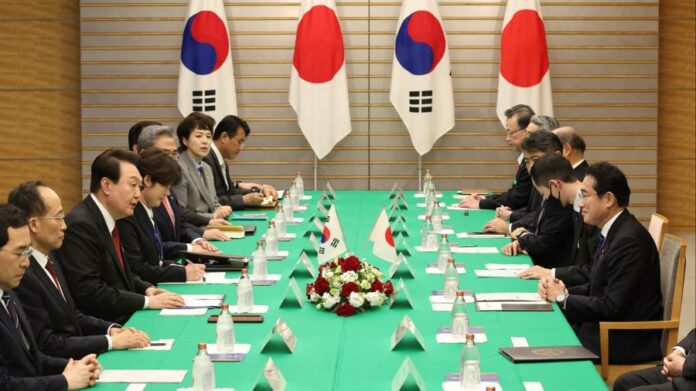Japan and South Korea have resolved a trade dispute over semiconductor materials as the US allies seek to repair strained ties amid geopolitical tensions with China and the growing threat of North Korea’s nuclear weapons programme.
Japan said on Thursday it would lift export controls imposed in 2019 on chemicals vital to South Korea’s chip industry, while Seoul said it would withdraw a complaint lodged against Tokyo with the World Trade Organization over the restrictions.
The breakthrough came ahead of a summit in Tokyo on Thursday evening between Japan’s prime minister Fumio Kishida and South Korea’s president Yoon Suk Yeol, the first such official meeting since 2011 as the countries seek to improve relations.
Seoul announced lst week that victims of Japanese wartime forced labour practices would be compensated through a fund financed by South Korean companies.
The US hailed the move as a “groundbreaking” step to resolve a bitter historical dispute but it was denounced by representatives of some of the victims and South Korea’s leftwing opposition for failing to secure payments from Japanese companies. Seoul had hoped Japanese companies would make voluntary contributions to the fund but failed to gain Tokyo’s agreement.
Instead, the Japanese and South Korean business lobbies will pay ¥200mn ($1.5mn) into a pair of “future partnership” funds to collaborate in areas including youth exchanges, energy security and global supply chain issues.
“The need for the two countries to co-operate has increased in the wake of Covid-19, deepening US-China competition and global weaponisation of natural resources,” said acting chair of the Federation of Korean Industries Kim Byong-joon on Thursday.
South Korean and Japanese companies, particularly in the chip sector, have been squeezed by an escalating US campaign to restrict China’s access to western technology and markets.
The rapprochement has also been driven by mounting concerns in Seoul and Tokyo over the progress of North Korea’s nuclear weapons programme. Pyongyang conducted a barrage of missile launches this week to coincide with US-South Korean military drills.
Japan and South Korea are expected to upgrade security co-operation and intelligence sharing as relations improve.
Diplomatic relations between Tokyo and Seoul collapsed in 2018 after South Korea’s Supreme Court ordered two Japanese companies, Mitsubishi Heavy Industries and Nippon Steel, to compensate Korean victims of forced labour during the second world war.
Tokyo has insisted that relations could not be restored until the threat of liquidation of the companies’ assets in South Korea was lifted.
That legal threat remains in theory, but analysts said Yoon’s willingness to pursue compensation for plaintiffs through Korean companies appeared to satisfy Tokyo for the time being.
Christopher Johnstone, Japan chair at the CSIS think-tank and a former Pentagon official, said the prospect for a sustained thaw in relations was better than in 2015 following a landmark agreement over wartime sexual slavery, which later collapsed after it was disowned by Moon Jae-in, Yoon’s leftwing predecessor.
“I think the deal will be more sustainable this time since the strategic environment is clearly different from 2015, and the two countries have a broader set of shared concerns, including not only North Korea but China as well,” said Johnstone.
But Wi Sung-lac, a former senior South Korean diplomat who has advised the leader of the leftwing opposition, argued that Yoon’s failure to secure wide domestic support could limit the possibility for deeper co-operation.
“The aftermath will be somewhat detrimental to the Yoon administration’s popularity,” said Wi. “That will sap the government’s energy in building a new relationship with Tokyo.”






